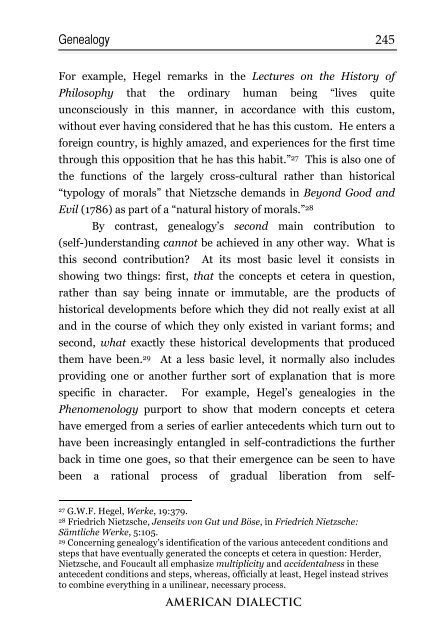Genealogy Michael Forster - American Dialectic
Genealogy Michael Forster - American Dialectic
Genealogy Michael Forster - American Dialectic
You also want an ePaper? Increase the reach of your titles
YUMPU automatically turns print PDFs into web optimized ePapers that Google loves.
<strong>Genealogy</strong><br />
AMERICAN DIALECTIC<br />
245<br />
For example, Hegel remarks in the Lectures on the History of<br />
Philosophy that the ordinary human being “lives quite<br />
unconsciously in this manner, in accordance with this custom,<br />
without ever having considered that he has this custom. He enters a<br />
foreign country, is highly amazed, and experiences for the first time<br />
through this opposition that he has this habit.” 27 This is also one of<br />
the functions of the largely cross-cultural rather than historical<br />
“typology of morals” that Nietzsche demands in Beyond Good and<br />
Evil (1786) as part of a “natural history of morals.” 28<br />
By contrast, genealogy’s second main contribution to<br />
(self-)understanding cannot be achieved in any other way. What is<br />
this second contribution? At its most basic level it consists in<br />
showing two things: first, that the concepts et cetera in question,<br />
rather than say being innate or immutable, are the products of<br />
historical developments before which they did not really exist at all<br />
and in the course of which they only existed in variant forms; and<br />
second, what exactly these historical developments that produced<br />
them have been. 29 At a less basic level, it normally also includes<br />
providing one or another further sort of explanation that is more<br />
specific in character. For example, Hegel’s genealogies in the<br />
Phenomenology purport to show that modern concepts et cetera<br />
have emerged from a series of earlier antecedents which turn out to<br />
have been increasingly entangled in self-contradictions the further<br />
back in time one goes, so that their emergence can be seen to have<br />
been a rational process of gradual liberation from self-<br />
27 G.W.F. Hegel, Werke, 19:379.<br />
28 Friedrich Nietzsche, Jenseits von Gut und Böse, in Friedrich Nietzsche:<br />
Sämtliche Werke, 5:105.<br />
29 Concerning genealogy’s identification of the various antecedent conditions and<br />
steps that have eventually generated the concepts et cetera in question: Herder,<br />
Nietzsche, and Foucault all emphasize multiplicity and accidentalness in these<br />
antecedent conditions and steps, whereas, officially at least, Hegel instead strives<br />
to combine everything in a unilinear, necessary process.


